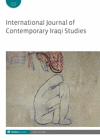- Home
- A-Z Publications
- International Journal of Contemporary Iraqi Studies
- Previous Issues
- Volume 7, Issue 1, 2013
International Journal of Contemporary Iraqi Studies - Volume 7, Issue 1, 2013
Volume 7, Issue 1, 2013
-
-
The United States’ withdrawal from Iraq: Challenges and results
More LessAbstractThis essay examines the internal repercussions for Iraq of the US withdrawal. They can be summarized as the lack of a national political agenda that could lead to a unified Iraqi state; the absence of an Iraqi-centered army with national sovereignty as its main concern; failure to resolve conflicts between the Iraqi center and its periphery about a number of issues, including oil and gas; lack of clarity in the Constitution, especially paragraphs that deal with sectarianism and ethnic quotas; and a failure to resolve administrative and financial corruption.
-
-
-
Diplomacy of the Kurdish territorial nation
More LessAbstractThis article argues that focusing on the foreign policy choices of the Kurdish leadership since Mulla Mustafa Barzani began seeking autonomy within Iraq will shed light on the strengths and weaknesses of the Kurdish national movement. This essay sketches the rise of the Kurdish-American and Kurdish-Israeli alliances which aided the Kurds during the American occupation of Iraq. Due to Kurdish desire to consolidate their control over the hydrocarbon resources of their region, Iraq and the Kurdish Regional Government find themselves locked in a dangerous struggle, which involves Turkey, Iran and Israel. Particular attention is paid to the refractory nature of these alliances and the implications of Kurdish Iraqi autonomy to the Kurdish communities of the region.
-
-
-
Change or more of the same? Obama and Iraq
More LessAbstractThis article traces the changes in US foreign policy towards Iraq under the Obama presidency. Although Obama adopted a less aggressive and more cautious approach to Iraq than that of George W. Bush, the long-term interests and goals of the United States in Iraq remained much the same. In the ongoing struggle between the central government in Baghdad and the Kurds the United States is caught in the middle while trying to appease both sides. In addition, the involvement of the U.S. petroleum industry in Iraq is of particular importance to the United States and this long-term interest remains the same whether a Republican or Democrat is in the White House.
-
-
-
‘Walling’ Baghdad: Spatial dissonance and tactics of war
More LessAbstractThis article examines the phenomenon of ‘walling’ in Baghdad. I demonstrate how barrier walls and internal borders represent a politicized manifestation of what Anibal Quijano calls the ‘coloniality of power’ (Quijano 2000: 533) a highly racialized and power-inflected Euro-centered discourse of Otherness destined to create distinctions between Euro-American ‘civilization’ and ‘third world backwardness’. At the same time, I will also show how Iraqi writers and poets create resisting narratives that contest the walls of coloniality in an anti-occupation poetics. These writers also contest the sectarian and gender violence that results from physical and symbolic territorial demarcations destined to create a fragmented city and a violated national imaginary.
-
Most Read This Month


